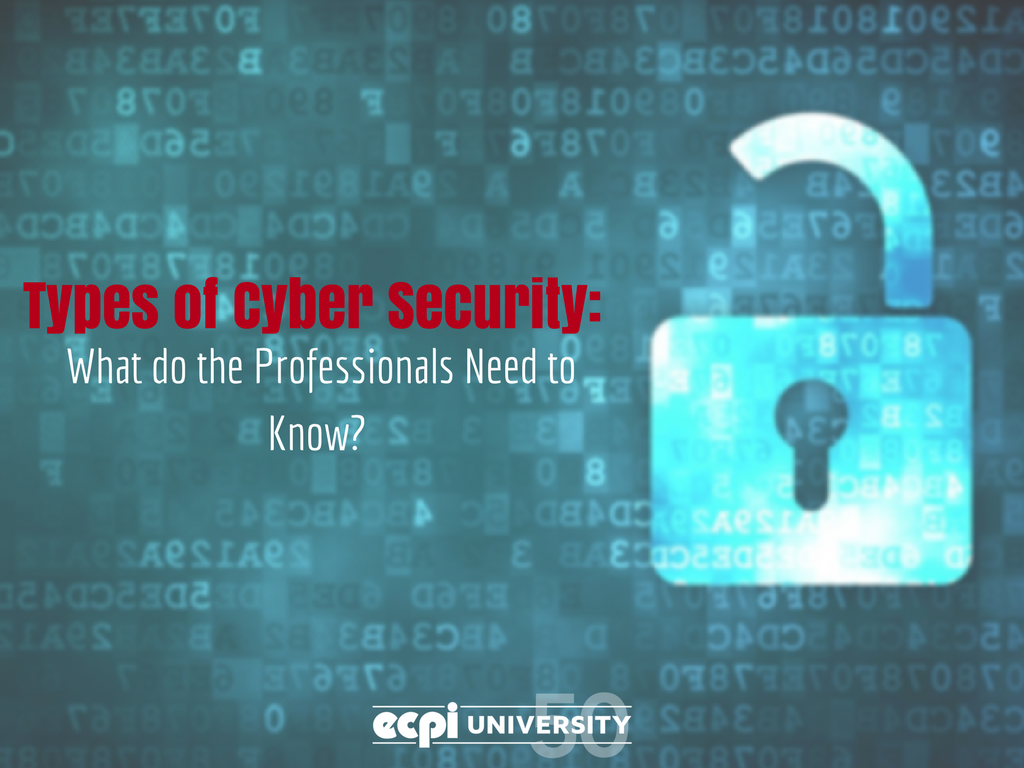Types of Cyber Security: What do the Professionals Need to Know?
If you've ever been interested in cyber security, now is a great time to gain the education you need to help keep the internet safe. In our increasingly connected world, where even household appliances are connected to the internet, there are also more opportunities than ever before for cyber criminals to wreak havoc on businesses and individuals alike.
Cyber attacks have come a long way from the email viruses of old (although those still exist as well). As criminals adapt to changing times, so too do the IT security experts whose job it is to keep our data safe. Here are some of the most common types of cyber attacks, and some of the cyber security methods used to fight back.
Malware
Malware has been around for a long time, and continues to plague computers to this day. Malware is catch-all word for any software designed to damage a computer or computer system. The first widely spread malware, known as the Melissa Virus, was unleased in 1999. Eighteen years later, malware remains a dangerous weapon, used by cyber criminals to harvest information, commit fraud, or just cause mayhem.
Cyber security strategies for malware
For both homes and businesses, a good anti-malware software is essential. Anti-malware programs can both find and remove malware that has been installed on a computer, and prevent malware from installing itself in the first place. Also essential is instructing users to practice common sense when using the internet: never open unexpected email or chat attachments, and be careful when clicking links on the internet if you can't be certain where they'll lead.
DoS (Denial of Service) attacks
One of the simplest forms of cyber attack, DoS attacks shut down a target's servers, making it impossible to access their websites or use their online services. This is most commonly done by flooding a target's servers with traffic until they overload and crash. One of the most common forms DoS attack involves getting large numbers of attackers to flood their target's servers at once, making it almost impossible to block the incoming traffic.
Strategies for DoS attacks
The simplest method for thwarting DoS attacks is having extra bandwidth. If you fear your business might be targeted for DoS attacks, simply having enough server space to handle the increased traffic can render the attacks moot. There are also third-party services who can help your company stay online during a DoS attack
Phishing
In a phishing attack, a cyber criminal attempts to extract personal information out of you by tricking you into giving it to them. Bolder scam artists might attempt to acquire a victim's social security number or bank account information. However, many phishing scams involve tricking a victim into giving away their password for a single website or app. A recent phishing scam used Google Docs to trick users into entering their Google login information.
Strategies for Phishing attacks
Phishing attacks are particularly worrisome because they involve tricking users through the appearance of legitimacy; the Google Docs scam spread by tricking users into opening a shared document sent to them by someone they knew and submitting their login info. Their attackers could then steal that information and send the document to everyone on the victim's contact list, causing the scam to spread rapidly.
The simplest way to combat phishing is to make sure employees know both of how common and damaging attacks can be. Remind them to keep their guard up when checking emails and to report any email they find suspicious. Additionally, have employees use two-factor authentication for their email accounts. This can prevent scammers from accessing compromised accounts.
Are you interested in cyber security? Even if you don't know much about computers, a good degree program can help you learn. Your cyber security education will teach you the essentials of cyber security, including how to plan and execute a solid cyber security strategy.
ECPI University offers a Bachelor of Science Degree in Computer and Information Science with a Major in Cyber and Network Security - Cybersecurity Track. With an accelerated schedule and year-round classes, you could find yourself earning your degree sooner. If you’d like more information, don’t hesitate to contact a friendly admissions advisor today.
It could be the Best Decision You Ever Make!
DISCLAIMER – ECPI University makes no claim, warranty, or guarantee as to actual employability or earning potential to current, past or future students or graduates of any educational program we offer. The ECPI University website is published for informational purposes only. Every effort is made to ensure the accuracy of information contained on the ECPI.edu domain; however, no warranty of accuracy is made. No contractual rights, either expressed or implied, are created by its content.
For more information about ECPI University or any of our programs click here: http://www.ecpi.edu/ or http://ow.ly/Ca1ya.





